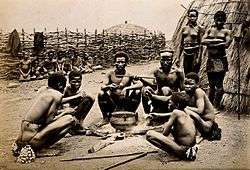Hlubi people

The Hlubi (or amaHlubi) are an ethnic group who originate from the Samburu people of Kenya and the Shubi, an ethnic and linguistic group based in the Kagera Region of Tanzania. The amaHlubi took part in the southward migration of the eMbo group/nation or amaLala from central Africa. After settling briefly along the Lubombo mountains, a mountain range which extends from northern (present day) Zululand northwards along the Swaziland-Mozambique border, they migrated still further south and settled in what today is known as KwaZulu-Natal as long ago as the 13th century, leaving behind a section of their group which later became the amaSwazi nation. For at least two centuries they have been a part of the Nguni, Mbo or Lala nation. At present they live in Mozambique, Swaziland and the Republic of South Africa in the KwaZulu-Natal, Eastern Cape and North West provinces. They were traditionally hunters and warriors but now are predominantly agriculturalists. The amaHlubi are the oldest in origin and are a much older tribe than either the amaZulu or amaXhosa. Little is documented about this tribe, as most of the literature concerns the time of King Langalibalele, which consequently offers little in terms of the roots of the amaHlubi nation.
Hlubi kings
Below is a traditional estimation of the Hlubi kings that ruled from 1300 till the present day.[1] Note that Hlubi history comes mainly from oral sources and especially the earlier estimated dates may be inaccurate.
| King | Reign |
|---|---|
| Chibi | 1300–1325 |
| Lubelo | 1325–1350 |
| Busobengwe (Bhungane I) | 1350–1370 |
| Fulathel’ilangjuhja | 1370–1390 |
| Bhele | 1390–1410 |
| Lufelelwenja | 1410–1430 |
| Sidwabasenkomo | 1430–1450 |
| Mhuhu | 1450–1475 |
| Mpembe | 1475–1500 |
| Mhlanga | 1500–1525 |
| Musi | 1525–1550 |
| Masoka | 1550–1575 |
| Ndlovu | 1575–1600 |
| Dlamini | 1600–1625 |
| Mthimkhulu I | 1625–1650 |
| Ncobo and later, Hadebe | 1650–1675 |
| Dlomo I | 1675–1710 |
| Mashiya | 1710–1720 |
| Ntsele | 1735–1760 |
| Bhungane II | 1760–1800 |
| Mthimkhulu II (Ngwadlazibomvu) | 1800–1818 |
| Dlomo II and later, Mthethwa (commonly known as Langalibalele I) | 1839–1889 |
| Siyephu (Mandiza) | 1897–1910 |
| Tatazela (Mthunzi) | 1926–1956 |
| Muziwenkosi (Langalibalelle ll) | 1974 – |
Language
The amaHlubi speak a dialect of or closely related to Swazi, one of the Tekela languages in the Nguni branch of the Niger–Congo language family.
The Hlubi dialect is endangered, and most Hlubi speakers are elderly and illiterate. There are attempts by Hlubi intellectuals to revive the language and make it one of the eleven recognised languages in South Africa.[1]
References
- 1 2 "Isizwe SamaHlubi: Submission to the Commission on Traditional Leadership Disputes and Claims: Draft 1" (PDF). July 2004. Retrieved 28 July 2011.
See also
| Wikimedia Commons has media related to Hlubi people. |
Further reading
- Henry Masila Ndawo (1939). Iziduko zama-Hlubi. Lovedale Press. Retrieved 31 July 2011.
- Henry Masila Ndawo (1945). Ibali lamaHlubi. Lovedale Press.
- Andrew Hayden Manson. The Hlubi and Ngwe in a colonial society, 1848–1877. s.n. Retrieved 31 July 2011.
- Alfred T. Bryant (1965). Olden times in Zululand and Natal: containing earlier political history of the Eastern-Nguni clans. C. Struik. Retrieved 31 July 2011.
- John Henderson Soga (1930). The south-eastern Bantu: (Abe-Naguni, Aba-Mbo, Ama-Lala). The Witwatersrand university press. Retrieved 31 July 2011.
- John Britten Wright; Andrew Manson (1983). The Hlubi chiefdom in Zululand-Natal: a history. Ladysmith Historical Society. ISBN 978-0-620-06178-0. Retrieved 31 July 2011.
- John William Colenso (1875). Langalibalele and the amahlubi tribe: being remarks upon the official record of the trials of the Chief, his sons and Induna, and other members of the amahlubi tribe. Retrieved 31 July 2011.
- Paul Maylam (1986). A history of the African people of South Africa: from the early Iron Age to the 1970s. St. Martin's Press. ISBN 978-0-312-37511-9. Retrieved 31 July 2011.